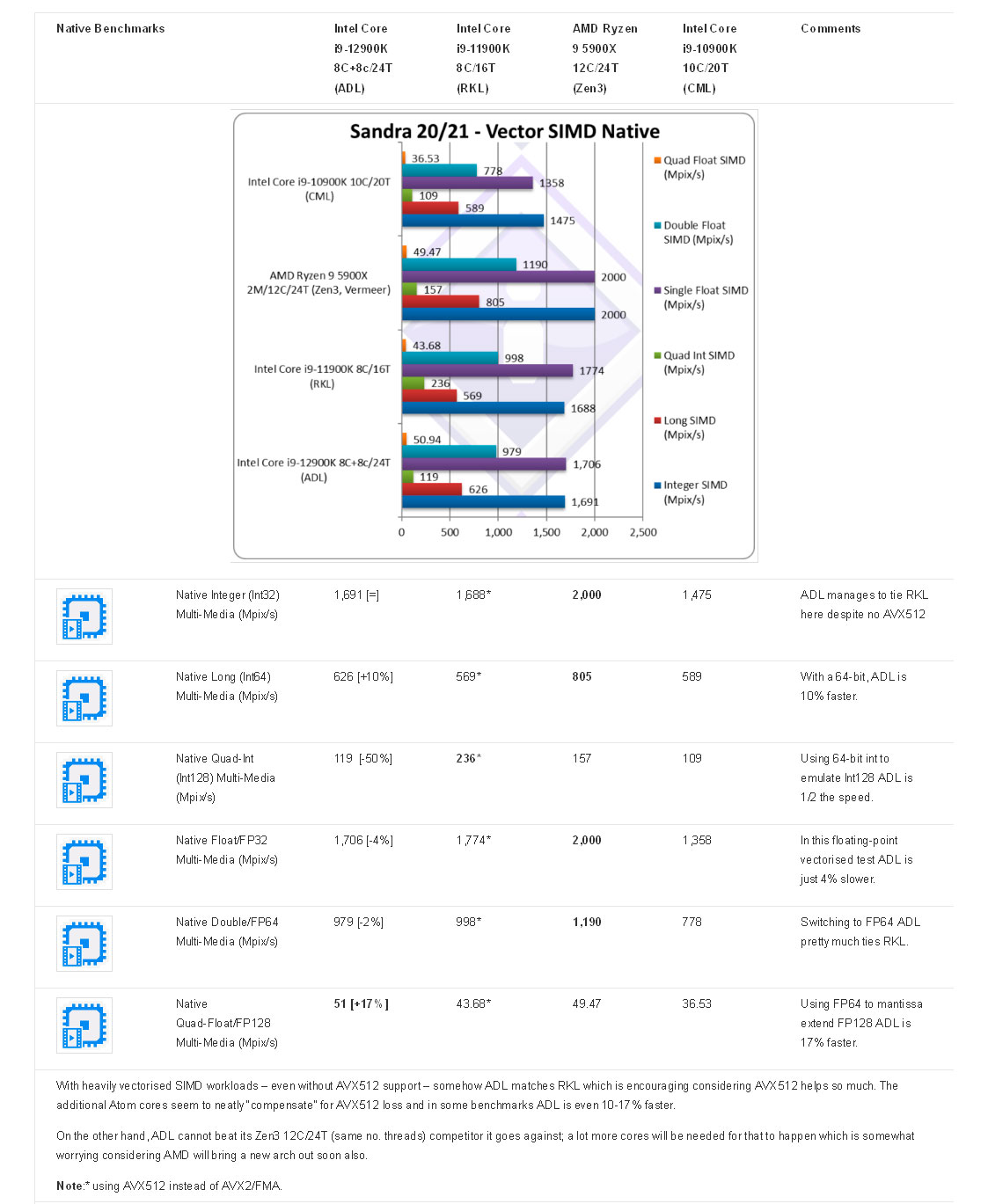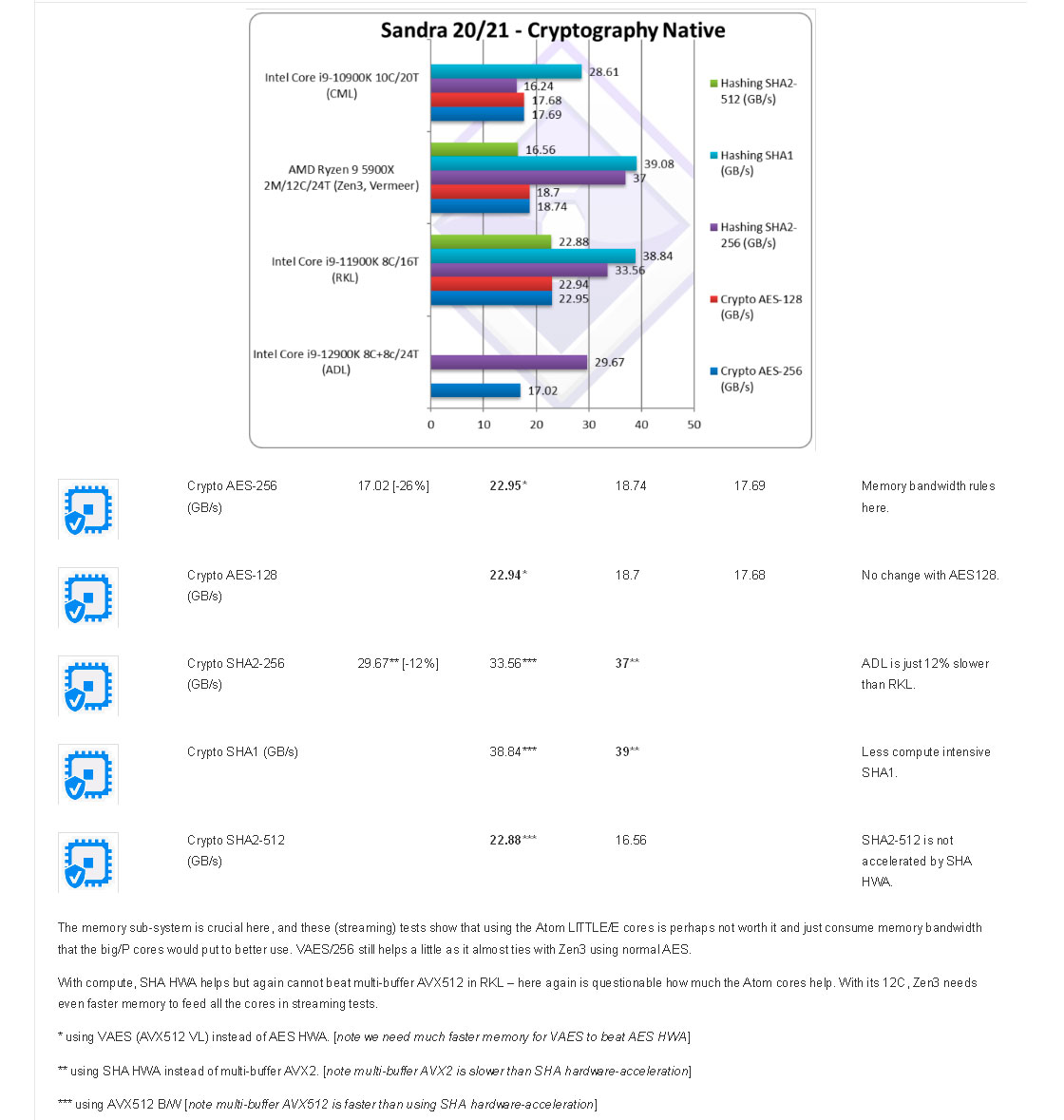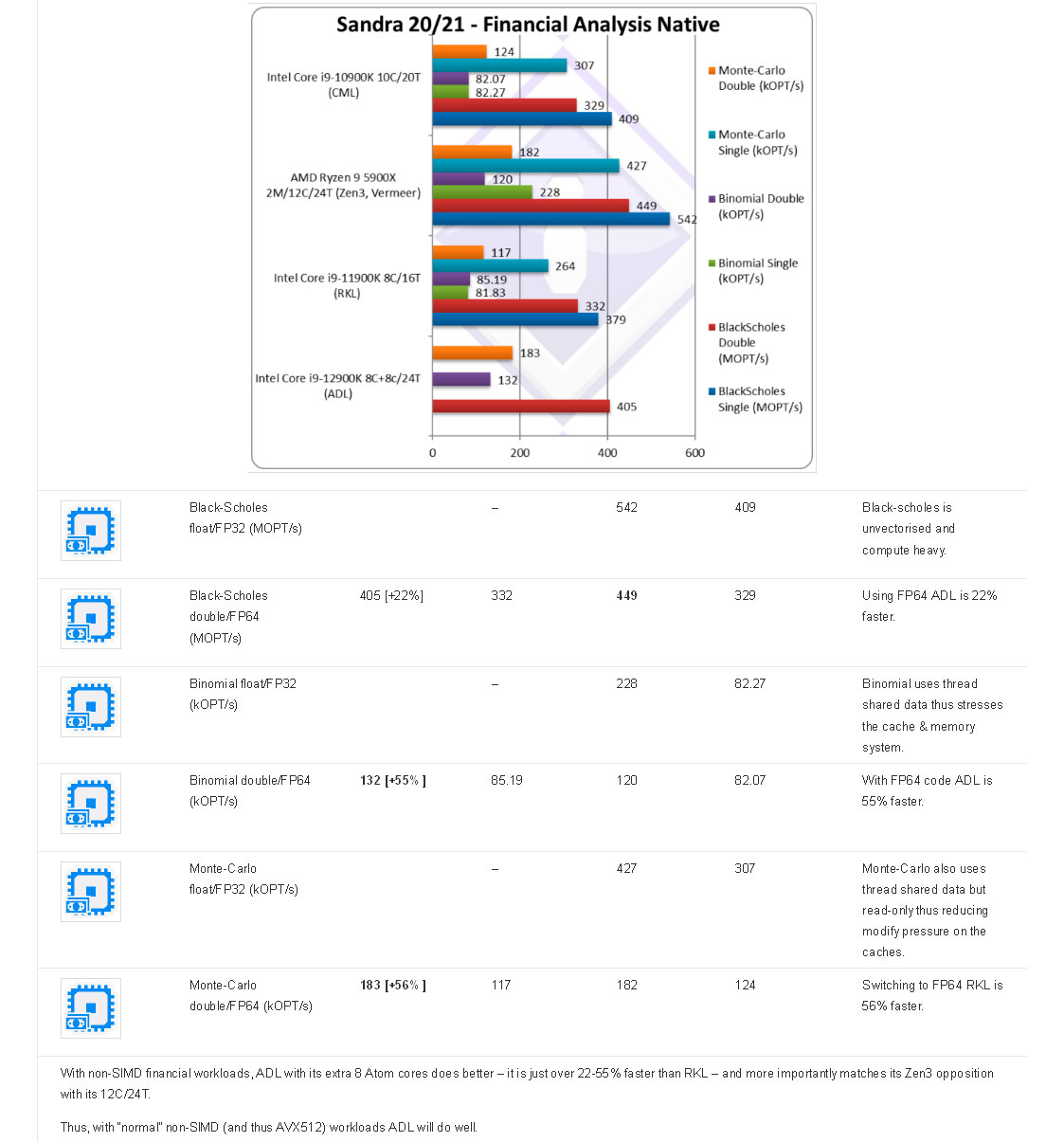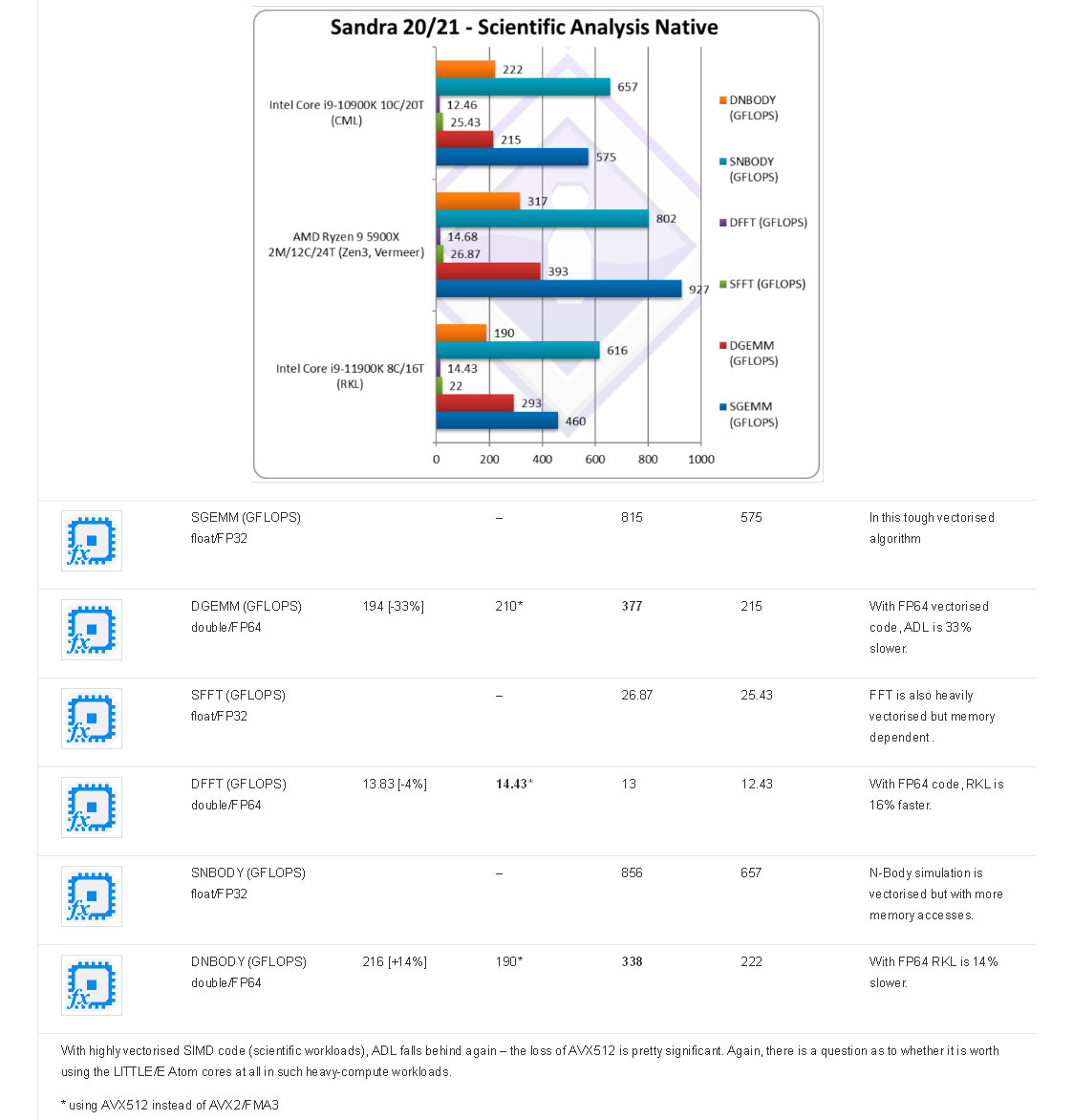Upcoming Core i9-12900K Takes on Core i9-11900k, Ryzen 9 5900X in New Benchmarks
Over the weekend, SiSoftware compiled a small performance preview of Intel's Core i9-12900K Alder Lake processor-based benchmark submissions to its database. The company eventually took down the preview, but not before hardware detective Tum_Apisak managed to take a screenshot of the entire blog post.
Alder Lake is Intel's first heterogeneous desktop platform, which combines high-performance Golden Cove cores and power-efficient Gracemont cores in the same package. Therefore, the operating system's scheduler has the important job of assigning the appropriate core to a given workload. This is where Microsoft's Windows 11 with its improved scheduler comes in. But SiSoftware has already made the necessary changes to the company's Sandra software to support hybrid processors, such as Alder Lake. Therefore, users can properly test Alder Lake outside of Windows 11.
That said, SiSoftware didn't provide the complete specifications of the test systems. There weren't many benchmark results for the Core i9-12900K, so it's too early tp draw any conclusions. More importantly, the company admitted that there is still much optimization work to be done in order to fully exploit Alder Lake's computing potential. Therefore, we recommend you take the following results with a pinch or two of salt.
Intel Core i9-12900K Benchmarks
SiSoftware pitched the Core i9-12900K against Intel's own Core i9-11900K (Rocket Lake) and Core i9-10900K (Comet Lake) chips and AMD's Ryzen 9 5900X (Vermeer) Zen 3 part. The tested workloads include SIMD performance, cryptography, plus scientific and financial analysis performance. SiSoftware also provided a detailed comparison below the charts, with commentary on the results.




The overall takeaway from SiSoftware's summary is that the Core i9-12900K isn't a lot faster than the Core i9-11900K. The Alder Lake chip did manage to pull a few victories over the Ryzen 9 5900X, but the margins were small. The Ryzen 9 5900X, on the other hand, outperformed the Core i9-12900K by a significant margin in the majority of the workloads.
SiSoftware's results revealed that Alder Lake's performance in heavy-compute SIMD tests is in the same realm as Rocket Lake. In some instances, Alder Lake offered up to 10% higher performance. And according to SiSoftware, Alder Lake is around 50% faster than Rocket Lake in AVX2 workloads. In non-SIMD tests, however, Alder Lake is between 25% to 50% faster than Rocket Lake. This, at least, means that Alder Lake is competitive in comparison to Zen 3.
Intel will announce Alder Lake later this fall. A previous rumor pointed to a November 19 launch. MSI will offer an Alder Lake mounting upgrade for its CPU coolers starting on November 4, leading to speculation that the hybrid chips may launch earlier than was previously thought.
Get Tom's Hardware's best news and in-depth reviews, straight to your inbox.

Zhiye Liu is a news editor, memory reviewer, and SSD tester at Tom’s Hardware. Although he loves everything that’s hardware, he has a soft spot for CPUs, GPUs, and RAM.
-
alceryes The Ryzen 9 5900X still looks awesome here. Of course, this is one specific suite of tests.Reply
In 3-4 months, when we have a dozen reviews, across a myriad of scenarios, is when we will get the full picture.
This article equates to looking through a keyhole at a particular flash card being held up to the hole on the other side and strikes a remarkably different tone than the previous article, hmmm? ----> https://forums.tomshardware.com/threads/core-i9-12900k-destroys-ryzen-9-5950x-by-38-in-ashes-of-the-singularity.3725179/ -
Eximo I suppose if they can offload some background tasks to the efficiency cores, that would be the best case. Not expecting the throughput of all 24 threads in any normal scenario.Reply
But for most people just having the 8 cores and 16 threads is going to fill that niche for a while. Most systems are still quad cores. -
salgado18 If we assume the efficient cores will have ~70% of the performance of the fast ones, then a workload on all cores would equal to ~13.6 fast cores. That is, obviously, if the software can work it out, and there is enough cooling. In that scenario, it would be slightly faster than the 5900x, which, when it receives the extra cache, should catch up. I think Alder Lake won't be a revolution, but more of an attempt at getting more out of a hot and hungry architecture.Reply -
Eximo Yeah, they aren't going to run all those cores at full bore for long durations, at least at stock.Reply -
mitch074 Reply
I doubt the efficient cores will have anything close to 70% of the performance of the fast ones : for such results, you'd need a performance core running 15% slower - that's what AMD does with Zen2 and more recent.salgado18 said:If we assume the efficient cores will have ~70% of the performance of the fast ones, then a workload on all cores would equal to ~13.6 fast cores. That is, obviously, if the software can work it out, and there is enough cooling. In that scenario, it would be slightly faster than the 5900x, which, when it receives the extra cache, should catch up. I think Alder Lake won't be a revolution, but more of an attempt at getting more out of a hot and hungry architecture.
No, I estimate the efficient cores to have closer to 25-35% the performance of a fast core at the same frequency (taking SMP/HT into account) but actually run at half the clock speed and only use 2-3% of the power. Considering that many tasks don't need more than that and are still responsive (imagine a media player : video and sound are uncompressed by dedicated hardware, a CPU core would only be needed to handle I/O and stream unpacking - a 500 MHz ARM core can do that and still have some cycles leftover), it's an interesting solution. -
PCWarrior 8 Golden Cove P-cores @5GHz with hyperthreading are equivalent to 8x1.4042=11.23 Skylake Cores @5GHz with hyperthreadingReply
8 Gracemont E-cores @3.7GHz without hyperthreading are equivalent to 8x3.7/5x1/1.25=4.74 Skylake Cores @5Ghz with hyperthreading
So the E-cores have like 42.2% of the performance of the P-cores. In any case MT performance of the 12900K should on average be around that of a 16c/32t Skylake with all cores clocked at 5GHz. And on some workloads it might perform better than that.
A 5900X when it runs on all cores it clocks at 4.4GHz, so, though it enjoys a 15-25% IPC advantage (depending on productivity workload) over Skylake, its frequency deficit (against a 5GHz Skylake) reduces its lead down to 1-10%. This makes it equivalent to 12.12-13.2 Skylake cores with HT clocked at 5GHz. It follows that the 12900K should be 21-32% faster.
3D cache in the best case scenario will improve performance by 15%. If also due to a combination of increased TDP and process maturity the all-core frequency reaches what is now achieved with maximum OCing (4.7GHz) then that’s another 6.8% improvement, resulting a total (1.15*1.068=1.23) 23% improvement. That will make the 6900X able to compete with the 12900K in some productivity benchmarks but still beaten in most, especially where the effect of the extra cache will amount to almost no gains.
Yep. Now AMD fbs only care about SiSoft Sandra benchmarks...mdd1963 said:And just like that, Cinebench results no longer mattered! :) -
alceryes I wonder how good the algorithms are that decide on what task goes to a performance core and what task goes to an energy-efficient core?Reply
What about models that constantly work through different types of data? In one moment it works through a 5-second dataset on the energy-efficient core but the next moment is a 5 minute set that SHOULD be on the performance core. Can workloads be migrated between performance and energy-efficient cores (like on ARM's big.LITTLE cores)? What's the migration latency between cores? -
alceryes Something I also find...interesting.Reply
Why are there no productivity numbers in all the leaked benchmarks thus far? Some of us sometimes do things, other than gaming, on our computers. ;)
It also looks like the gaming benchmarks leaked thus far include the same 6 games, from multiple reviewers. Now, the reviewers don't come out and say that these are 'their' results, but it almost leads me to believe that it's just more 'bubblegum chew' on the exact same single set of benchmarks.
No, I don't want to wear the tinfoil hat just yet, but the wait for actual reviews and benches from the top 5-10 reviewers (including here at Tom's), is getting difficult.